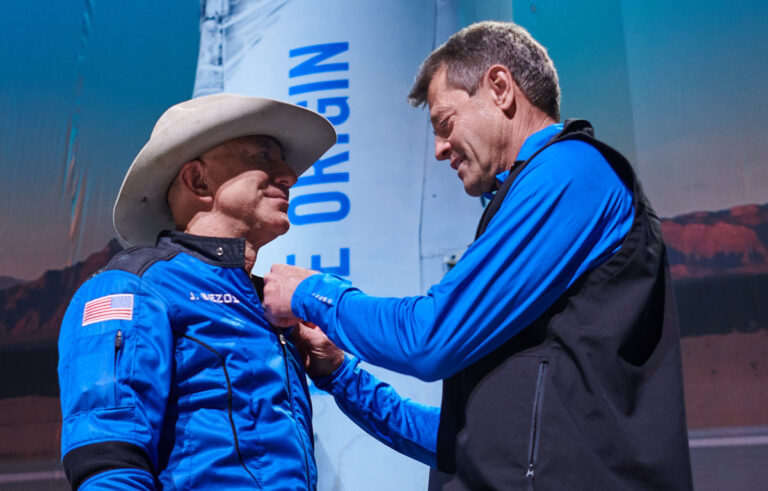Who counts as an astronaut? Not Jeff Bezos, says new US policy

They did it, everyone. Billionaires Richard Branson and Jeff Bezos both made it to space on their respective companies’ spacecraft—although I’m sure the former would like for it to be precised that ‘he did it first’. Since then, space tourism has been on everyone’s lips. But not every person who goes to space is officially considered an astronaut. The US Federal Aviation Administration (FAA) has tightened its rules for how it awards astronaut wings to those riding on private space flights, making it harder to become an official commercial astronaut.
In the US, there are three agencies that designate people as astronauts: the US military, NASA, and the FAA. The former two only give wings to their own employees, so the only way to be officially recognised as an astronaut after a flight on a commercial spacecraft is to be awarded wings from the FAA. They don’t come with any particular privileges beyond bragging rights.
For the FAA to award wings, an astronaut must be employed by the company performing the launch—so tourists that have bought tickets are out. They must also go through training to be certified by the FAA as an astronaut and fly higher than 80 kilometres. And they must have “demonstrated activities during flight that were essential to public safety, or contributed to human space flight safety,” according to the new order providing the guidelines.
With private space ventures such as Bezos’ Blue Origin and Richard Branson’s Virgin Galactic making advances in space tourism, the revised rules restrict who are eligible for astronaut wings. So, what counts as a ‘contribution’ then? Whether a crew member has made a contribution to space flight safety is up to the discretion of FAA officials. Over the last decade, the agency has awarded astronaut wings only to the pilots of spacecraft—“the one exception was Beth Moses, a Virgin Galactic executive who flew aboard the company’s SpaceShipTwo craft in 2019,” writes New Scientist.
The main criteria seems to be that the astronauts must be designated as crew members performing some task aboard their flights, not simply passengers. Keeping that in mind, when it comes to Richard Branson’s 11 July flight, Virgin Galactic designated him and the other three passengers on the flight as crew members testing the spacecraft, but it’s not clear whether they “contributed to human space flight safety” in general.
Things are clearer in the case of the 20 July Blue Origin flight: the spacecraft was entirely controlled from the ground, not by Jeff Bezos or any of the other three passengers, so all they had to do was enjoy the ride. “This is an autonomous vehicle. There’s really nothing for a crew member to go do,” Blue Origin Chief Executive Bob Smith said at a media briefing before the launch. That means that they don’t qualify for astronaut wings under the FAA’s new rules. Sorry, Bezos.
However, the new order also notes that individuals who demonstrate “extraordinary contribution or beneficial service to the commercial human space flight industry” merit special recognition. “These individuals receiving an honorary award may not be required to satisfy all eligibility requirements,” FAA noted in the revised rules.
This means that Wally Funk, a passenger on the Blue Origin flight, who trained to be a NASA astronaut in the 1960s but did not get to go to space then, may still get her astronaut wings.





